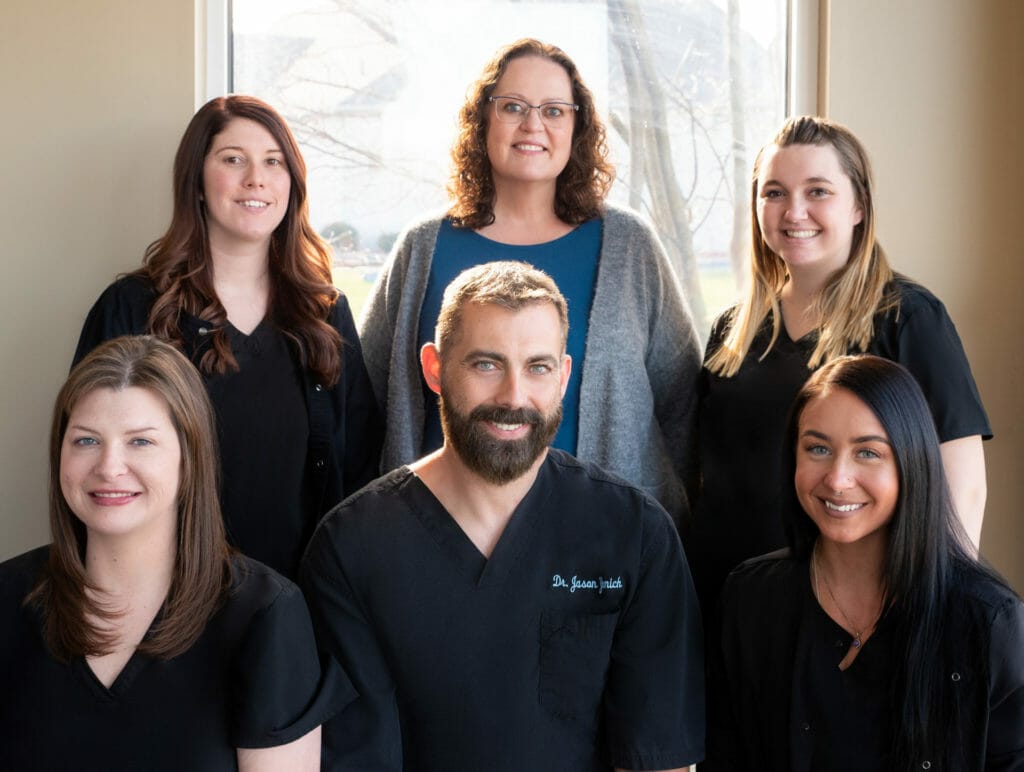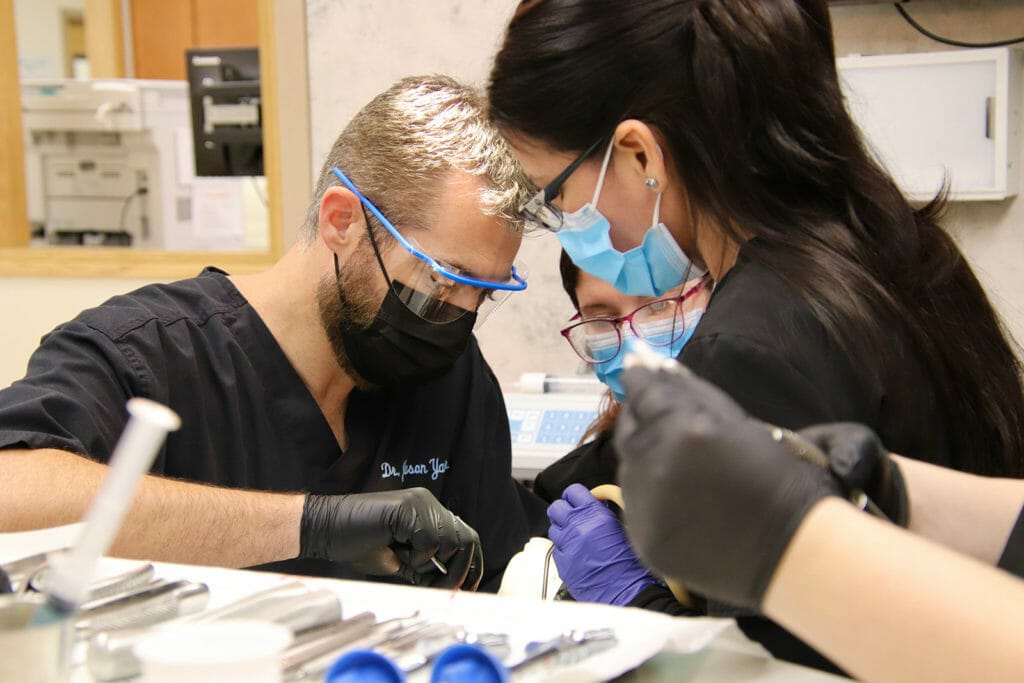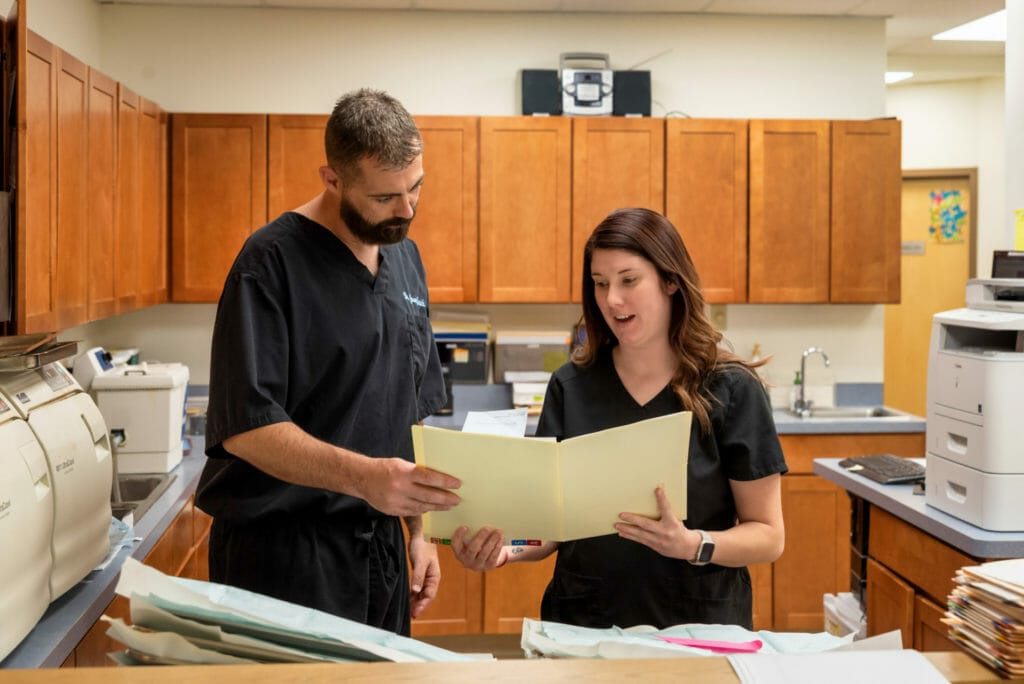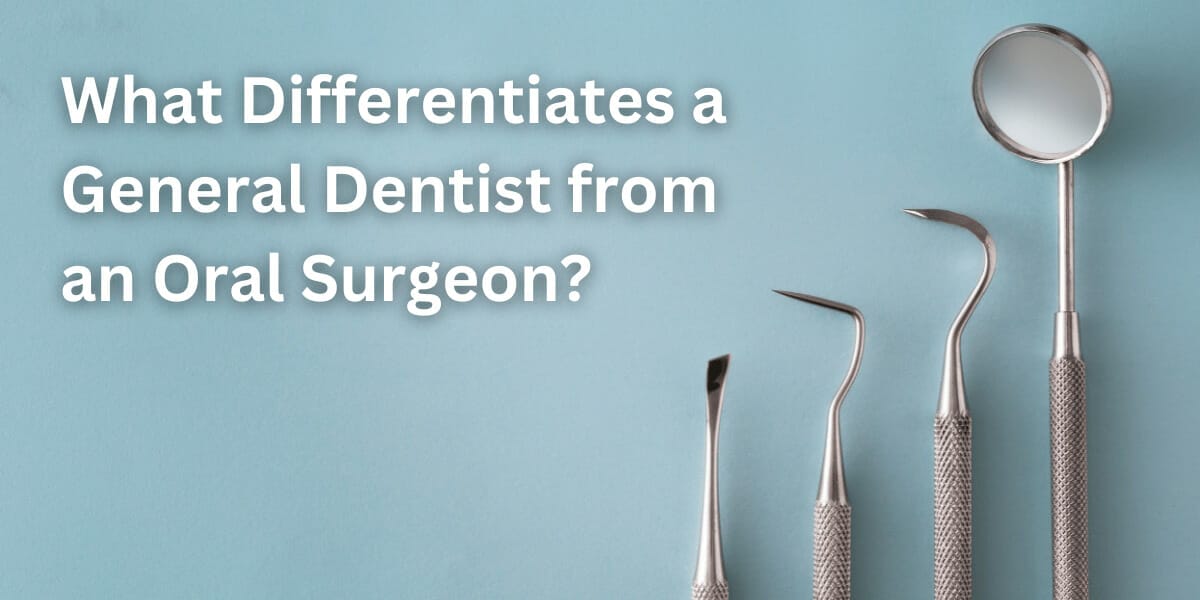Many wonder, “What is the difference between a general dentist and an oral surgeon?” Keep reading to uncover the differences, breaking them down in an easy-to-understand format.
Whether you’re a patient seeking the proper care or simply curious, our comprehensive guide will shed light on this topic and help you make informed decisions about your dental health.
Understanding Dental Care: The Basics

Dental health is vital essential due to the following reasons:
- Affects Overall Health: Poor dental health can lead to serious medical conditions like heart disease and diabetes. It can even contribute to cognitive decline.
- Improves Self-esteem: A healthy, beautiful smile can boost confidence and self-esteem, improving social interactions.
- Prevents Disease: Regular check-ups and cleanings can help detect early signs of diseases, even beyond dental problems.
Brief Overview of the Dental Field
The dental field is broad, with various specialists trained to handle different aspects of oral health.
- General Dentists: They are your primary dental care providers. They diagnose, treat, and manage oral health care needs, including cleanings, fillings, crowns, veneers, bridges, preventive education, and more.
- Specialists: These are dentists who have completed additional specialized training after their general dental education. This group includes orthodontists (teeth alignment), periodontists (gum specialists), endodontists (root canal therapy), and, of course, oral surgeons (complex surgical procedures in the mouth).
- Oral Health Support Staff: These include dental hygienists, dental assistants, and dental technicians who assist in providing oral health services.
Who is a General Dentist?
A general dentist is your primary dental care provider, typically the first professional you consult for dental health needs. They are trained to:
- Perform comprehensive dental exams to assess your overall oral health.
- Detect oral health problems early and provide appropriate treatment or referrals.
- Manage your preventive dental care routine.
- Educate patients on proper oral hygiene practices.
Education and Training Required for a General Dentist
Becoming a general dentist involves extensive education and training. Here’s the typical path:
- Undergraduate Degree: A four-year bachelor’s degree, usually with a focus on a science-related field.
- Dental School: Four additional years of rigorous dental education leading to a Doctor of Dental Surgery (DDS) or Doctor of Dental Medicine (DMD) degree.
- Licensure: Following their degree, dentists must pass national and state exams to become licensed practitioners.
Common Services Provided by a General Dentist
A general dentist offers a broad spectrum of services to maintain your oral health. These include:
- Preventive services, such as regular cleanings and oral exams, help avoid or catch dental disease in its early, treatable stages.
- Restorative services, such as fillings, crowns, or bridges, to treat oral health problems like tooth decay or gum disease.
- Cosmetic procedures, such as teeth whitening or veneers, to enhance the appearance of your smile.
- Overall health advice, including dietary counseling and advice on tobacco cessation.
Exploring the Role of an Oral Surgeon

An oral surgeon, also known as an oral and maxillofacial surgeon, specializes in treating complex oral health problems that require surgical intervention. They often handle cases beyond the scope of a general dentist.
The role of an oral surgeon, which Dr. Jason Yanich provides, involves the following:
- Conducting complex surgical procedures in the mouth, jaw, face, and surrounding tissues.
- Diagnosing and treating oral diseases, injuries, and defects.
- Collaborating with other professionals like orthodontists and general dentists to provide comprehensive care.
Education and Training Required for an Oral Surgeon
Becoming an oral surgeon is lengthy and involves rigorous education and training. Here’s what it typically involves:
- Undergraduate Degree: A four-year bachelor’s degree, often in a science-related field.
- Dental School: An additional four years of dental education leading to a Doctor of Dental Surgery (DDS) or Doctor of Dental Medicine (DMD) degree, similar to a general dentist.
- Residency Program: After dental school, prospective oral surgeons undertake a 4-6 year surgical residency program in an accredited hospital. This residency covers general surgery, anesthesiology, and oral and maxillofacial surgery.
- Certification and Licensure: To become licensed, oral surgeons must pass national and state exams. They can also choose to be board-certified by passing an American Board of Oral and Maxillofacial Surgery examination.
Typical Procedures Performed by an Oral Surgeon
Oral surgeons are skilled in performing a range of complex procedures, including:
- Tooth Extractions: Particularly complicated extractions, such as impacted wisdom teeth.
- Dental Implants: The surgical placement of dental prosthetics.
- Oral Pathology: Diagnosis and treatment of oral diseases, including oral cancer.
- Facial Reconstructive Surgery: Following trauma or disease.
- Corrective Jaw Surgery: To address TMJ disorders, malocclusion, or facial trauma.
- Cleft Lip/Palate Surgery: Corrective surgery for these birth defects.
When to Visit a General Dentist or an Oral Surgeon

Knowing when to visit a general dentist or seek help from an oral surgeon feels like a puzzle, but it doesn’t have to be. By understanding the roles of each professional and the situations they handle, you can make informed decisions about your oral health.
Scenarios for Visiting a General Dentist
Think of your general dentist as the first line of defense for your oral health. You should visit your general dentist for:
- Regular check-ups and cleanings.
- Preventive care, such as fluoride treatments and sealants.
- Basic restorative services like fillings, crowns, or bridges.
- Cosmetic procedures, including teeth whitening or veneers.
- Early detection of oral health issues, with referrals to specialists if needed.
Scenarios for Visiting an Oral Surgeon
While your general dentist can handle a wide range of oral health issues, certain situations require the expertise of an oral surgeon:
- Complex tooth extractions, such as impacted wisdom teeth.
- Dental implant placement.
- Diagnosis and treatment of oral and facial diseases or injuries.
- Surgical correction of jaw problems.
- Facial reconstruction following trauma or due to congenital issues.
Importance of Referrals in Dental Care

Referrals are integral to dental care, ensuring you receive the right care for your specific needs. If your general dentist identifies an issue that falls outside their expertise, they will refer you to an appropriate specialist, such as an oral surgeon. Trusting this process is key to maintaining optimal oral health.
Wrap-Up: The Significance of Both Dental Professionals in Your Oral Health
By understanding the differences between these dental professionals, you can make informed decisions about when to visit a general dentist or seek the assistance of an oral surgeon.
If you find yourself in need of an oral surgeon in Marion, OH, whether it’s for wisdom teeth extraction, dental implants, or corrective jaw surgery, we invite you to schedule an appointment with Yanich Oral Surgery.


